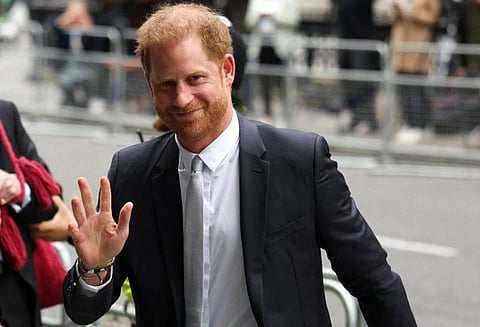Prince Harry: Phone-hacking was on industrial scale in UK press
Papers say no evidence Harry has ever been a victim

London: Prince Harry said phone-hacking was carried out on an industrial scale across the British press and he would feel a sense of injustice if the High Court in London ruled he had not been a victim.
Harry, the first senior British royal to give evidence in court for more than 130 years, was being grilled in the witness box for a second day on Wednesday over his allegations that tabloids had used unlawful means to target him since he was a child.
He faced almost five hours of cross-examination on Tuesday from Andrew Green, the lawyer for Mirror Group Newspapers (MGN), the publisher of the Daily Mirror, Sunday Mirror and Sunday People, which he and 100 others are suing over allegations of widespread unlawful information-gathering between 1991 and 2011.
Continuing his forensic questioning on Wednesday, Green said there was no mobile phone data to indicate that Harry had been the victim of phone-hacking and contrasted it with a 2005 police investigation that led to the conviction of the former royal editor at Rupert Murdoch’s now defunct News of the World paper.
“If the court were to find that you were never hacked by any MGN journalist, would you be relieved or would you be disappointed?” Green asked the prince, the fifth-in-line to the throne.
Harry replied: “That would be speculating ... I believe phone-hacking was on an industrial scale across at least three of the papers at the time and that is beyond doubt.
“To have a decision against me and any other people that come behind me with their claims, given that Mirror Group have accepted hacking, ... yes, I would feel some injustice,” he said.
In response to Green’s suggestion that Harry wanted to have been a victim, the prince replied: “Nobody wants to be phone hacked.”
Papers say ‘no evidence’ Harry was hacked
MGN, now owned by Reach, has previously admitted its titles were involved in phone-hacking - the illegal interception of mobile voicemails - settling more than 600 claims, but Green has said there was no evidence Harry had ever been a victim.
He argued that some of the personal information had come from, or was given with the consent of, senior Buckingham Palace aides.
Harry and the other claimants, however, are arguing during the seven-week trial that senior editors and executives at MGN knew about and approved of the unlawful behaviour.
In his 50-page written witness statement and in questioning, Harry has said the press had blood on its hands, destroyed his adolescence, ruined relationships with friends and girlfriends, and sowed paranoia and mistrust since 1996 when he was a schoolboy.
He also broke royal protocol to say he believed the British government as well as the media had hit “rock bottom”, while his anger at suggestions his mother, Princess Diana, was a victim of phone-hacking before her death in 1997 was also clear.
As on Tuesday, Harry again appeared relaxed, speaking firmly but softly, as Green quizzed him in detail over 33 newspaper articles whose details Harry claims were obtained unlawfully.
Green, who has described some of the prince’s allegations as “total speculation”, pressed him on what stories about his private life he considered would be in the public interest.
“A life-threatening injury,” Harry said. “I’m sure there are others.”
Sign up for the Daily Briefing
Get the latest news and updates straight to your inbox



